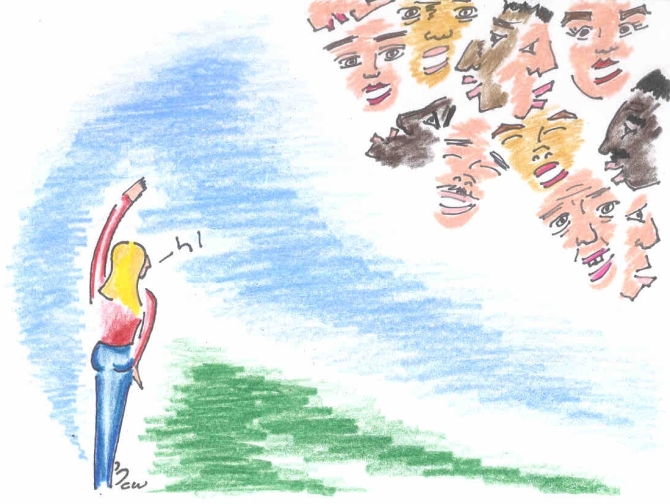 Introvert or extrovert? We humans are so eager to integrate b/w labels into the complex construction of our self-concepts. Personality tests like the Myers-Briggs Type Indicator draw us in with delicious promises of ‘the big reveal’ – as if by comfortably categorizing ourselves we can gain some sense of control over this mad world. Bullshit! This left brain lunacy closes us off to the real magic of our beings, that we are everything, the entire universe, all at once. But when these Jungian divisions feel so intuitive, how can they not be real?
Introvert or extrovert? We humans are so eager to integrate b/w labels into the complex construction of our self-concepts. Personality tests like the Myers-Briggs Type Indicator draw us in with delicious promises of ‘the big reveal’ – as if by comfortably categorizing ourselves we can gain some sense of control over this mad world. Bullshit! This left brain lunacy closes us off to the real magic of our beings, that we are everything, the entire universe, all at once. But when these Jungian divisions feel so intuitive, how can they not be real?
Introvert or extrovert? These two paradigm dependent words come loaded with data (neural linking to other words/ideas) involving energy exchange, information gathering/processing, and social habits. But let’s take Jung out of the picture. Are there two other, paradigm independent, words that conceptualize these intuitive system state differences with more organic accuracy?
Let’s try protection and connection.
Now let’s play. Our self-concepts are, by their nature, self-reporting and frighteningly subjective. Myers-Briggs (and in my opinion most, if not all, psychoanalysis… but don’t get me started!) really tests for who we think we are. Key word here, ‘think’ – a disturbingly limited, decidedly prefrontal activity of the brain. Our thoughts, born, yes, of true emotion, lead to our actions, which are reflected back to us by our viable worlds. This process is an extremely fluid back and forth, with change and influence happening concurrently in both directions. Anyone else see the loophole here?
Hypothetically, one’s proclivity for protection could be influenced by multiple factors and still be then categorized into a biological – and incredibly self-limiting – introversion. Dear readers, I sit before you as a case in point. For seven years now I have been rolling paper.  This is my job. The perk? Downtime. All I’ve ever wanted is to be left alone to learn, explore, and create. And when the universe gives you exactly what you fully believe you desire, and you find yourself itching, rasping, flailing, at some point you’ve got to sit yourself down and ask yourself WTF!? It’s time to do some double feedback loop learning and challenge our assumptions.
This is my job. The perk? Downtime. All I’ve ever wanted is to be left alone to learn, explore, and create. And when the universe gives you exactly what you fully believe you desire, and you find yourself itching, rasping, flailing, at some point you’ve got to sit yourself down and ask yourself WTF!? It’s time to do some double feedback loop learning and challenge our assumptions.
What if I’m not such an introvert after all? What if the very concept of introversion is actually a layered blockage of our innate human drive to connect? Like any argument, the key here is evidence – tracking back through history, science, and critical thinking to build a new case. Key to Jungian introversion is the dependence on an internal world, a re-storied reality to stand in for a truly shared viable world (guilty!!). This essentially prefrontal cortex construct already requires huge amounts of energy to sustain. Why do introverts feel so drained after social interaction? Couldn’t it be because they’re ‘thinking’ through the interaction (guilty!!), about self, about eye contact, about appropriateness? Mirror neurons automatically mimic our conversation partners. Couldn’t social appropriateness/rules be equally neurologically automatic for some people, requiring less processing and therefore minimal energy requirements? With an introvert’s dependency on the part of the brain responsible for self-awareness and advanced pattern detection/creation, doesn’t it make so much sense that less energy is expended when the pattern is more predictable and/or pre-wired, such as interacting with intimate family and friends, and one-on-one vs crowds? And what happens when we look at what shuts down this prefrontal middleman between us and ‘them’? It’s no coincidence that alcohol is know as the ‘social drug’.
Early social trauma could lead to another layer of cognitive protection. I grew up with two highly creative, top-of-their-field, yet highly isolationist parents, a social pattern I’ve found myself copying – which can put incredible pressure on one’s partner. We moved homes and/or schools almost every year of my early childhood. At one school I literally had zero friends. No one would talk to me, nobody, and I played the most pathetic solo-hopscotch at lunchtime (single tear). My daydreams, and my family’s love (I’ve been incredibly fortunate), were my only true consistencies growing up. Sure, my genes come from my parents, d’uh. But epigenetics is finding that which genes get turned on/off is highly dependent on experience.
Speaking of genes, let’s look at a common introvert combination which I like to call “the nerd cluster” (guilty!!), a phenotype combo expressed as proficient pattern recognition/processing (why we get off on math), extreme sensitivity to both emotional and environmental (allergies/asthma/eczema) factors, and compromised eyesight. Recognizing facial expressions is hard enough, but try spending a portion (before glasses) of your childhood spent in a blurred world. Note: my full, impassioned, sympathies to anyone on the Asperger’s/Autism spectrum! All of these factors facilitate and/or encourage a protective prefrontal where interpersonal connection is concerned.
So how can we test this theorizing and overcome introversion’s potential negative consequences: anxiety, isolation, addiction, and depression? Why bother becoming more social? Click to read the definitive, if extreme, argument. How do we journey from protection to connection? I’ve been testing this out lately, with surprisingly encouraging results. Or maybe not surprising at all considering the interconnectivity of our universe – our true natural system state. Connecting to self with unrelenting compassion is the first step – this is your grace, your strength, your training. Be fully present in your next interaction, not cognitively cupping your ego to protect it, but giving of your bare soul with wild generosity – eventually to the other person, but start with the moment. You can always trust time. I spent my twenties going out dancing, often by myself. My total abandon to the music, the present, was all the protection I ever needed. No more thinking, only being. I was free. I was the crowd. I was joy. Dance your next encounter and even if you stick your foot in your mouth and f*ck it all up, know that you’re nurturing a soul to come home to that will never never never let you play hopscotch alone again.

Personally I hate the ideation of categorising. I am simply me. I love to be diverse, to change only due to my own critical analysis, and to flourish with new experiences. I know if I was boxed, I would be fighting to get out 🙂 I embrace challenge and self-actualisation is based on challenging our own perception on a continuim 🙂
Beautifully put, Emma! Your last sentence is a motto to embroider onto couch cushions and placemats – which is to say, words to really ‘live’ by.
So many people spend their energies “fighting to get out” of those silly boxes, most often after willingly, even eagerly, allowing others to stuff them in there. Anti-authoritarians sometimes make me laugh. “I’m fighting the rules,” the say. “I’m stickin’ it to the man.” But why waste a life battling boxes when wading in between to find our own unique map of life and self is so much more rewarding. *Plus* it lets you enjoy so much more of the scenery on the way.
Love the writing on your blog! Why box a gift when you can put a pink flowered header bow on top 😉
Love the philosophy and I completely agree. To embrace our individuality is to live and let live 🙂
Dear Cymbria,
Great drawing.
So you heading into the world of people?
Okay I did not know or really imagine you having 0 friends. Our lives were somewhat distracted then I’m thinking.
Communication with a guru is way easier.
Most of the people in your drawing are happy….you must have caught them at a good time.
I guess you can’t loose playing solitary hop-scotch but neither can you win.
Go out and go home they are both there for everyone….it just takes courage as you say so eloquently.
See you soon
Love
Dave
Two words… Manor…. Park. But thank gawd it was only two months!!
“… caught them at a good time.” Well, ‘they’ do say extroverts generally have a more positive outlook on life. And you’d have to be pretty darn optimistic to be giggling away as a bodyless, earless head lolz! Thanks for the drawing compliment – I figured I had a fair bit of leeway for abstraction when posting such an indulgently abstract argument. But now that I’m practicing its conclusions, I’m actually discovering that it really might not be so abstract after all. Who knew?
Trust me, you can definitely lose at solo-hopscotch~
Can’t wait to see you!
I always look on psychometrics as a bullying device – I mean, a stranger asks you a few arbitrary questions where none of the available answers actually fit what you think, then slots you into an arbitrary and simplistic grid and INFORMS you what sort of person you REALLY are. If you argue, well, your character type WOULD be cynical, wouldn’t it. To me, psychometrics are intellectually empty and morally void – a product of early twentieth century rationality, long since superseded (I hope!).
The introvert/extrovert issue is interesting because it’s usually paired up with ‘abnormal/normal’ – introverts get pressured to socialise all the time, because ‘normal’ people like being with others. Well, introverts do too, funnily enough, but it drains them; whereas ‘extroverts’ get energy from that contact. And, again, I think human reality is a LOT more complex than our drive to systematise and categorise usually allows.